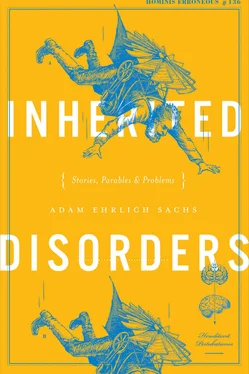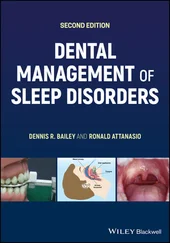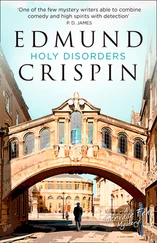33: DIVERGENCE FROM LESCANNE
…………………….
An admirer of the avant-garde French sculptor Lescanne modeled his life after his idol’s. He wore bright teal socks like Lescanne did, smoked hashish like Lescanne did, and sent his children off to live with his older sister just like Lescanne did a hundred years before. But whereas Lescanne had accidentally murdered his wife during a game of William Tell by shooting her in the face, his admirer successfully shot the apple off his wife’s head. The admirer’s wife was unwilling to try the game again.
The admirer has since stopped sculpting. He still wears the socks and smokes the drugs, but the continued existence of his wife, a preschool teacher, is now a constant reminder of the degree to which he has diverged from his idol.
…………………….
On the twentieth anniversary of his father’s disappearance during an ice climbing expedition, a son flew to Banff National Park in hopes of finding, at last, his father’s body. He was not, it turned out, the only one with that idea: on this bright spring day the park was virtually overrun with sons searching for their vanished fathers, each of whom had fallen through one crevasse or another. There was a kind of festival atmosphere. Every now and then a cry went up as another son found his preternaturally well-preserved father, still wearing, in almost every case, his helmet, his harness, and his crampons.
The son in question did not find his father, but the experience was nevertheless life-changing, like his Israel trip after sophomore year. There was something sort of holy about this search for these long-gone ice-climbing fathers, who — it escaped no one — had all, at one point, kissed their young sons good-bye to go scamper up a waterfall. The sons were all in this together. Everyone pitched in. There was no competition whatsoever, no rivalry, just sons helping sons break up these great big slabs of ice with specialized ice picks to see if their fathers were inside. Breaking apart an ice slab and finding a perfectly preserved ice-climbing father inside felt good regardless of whether it was your friend’s father or your own or the father of some guy you’d just met.
He went back the next year, and the year after, and the year after that. He didn’t find his father’s body, but in the sons of these missing ice climbers he found a community. At night they drank beer and sang songs. Alex, whose father was swallowed up by one of Canada’s deepest caves, or Kyle, whose father was later found split in three at the edge of a retreating glacier, thrummed an acoustic guitar. They wrote poems about their missing fathers and shared them with one another, the rule being that (constructive!) criticism was okay if and only if the author said it was. The fact that all their fathers were frozen here in the same ice fields, the same network of caves, brought a kind of cohesion to the group, the way that being Jewish and in Jerusalem and being rising high school juniors or seniors had once brought a bunch of complete strangers together.
Hence his ambivalence when, in year five, he broke up a block of ice and found inside his father’s corpse, eyes wrenched wide open, mouth agape, a coil of rope frozen around one shoulder. He realized at once that the body, which he had last seen when he was, like, six, meant nothing to him, that his father, whom he hardly remembered, meant little to him, and that what he’d actually valued was his father’s absence and everything connected to it, especially this great group of like-minded guys. His first impulse was to cover up the discovery, pretend it never happened, “keep looking” for his father for the rest of his life along with everyone else, but someone (Kyle?) saw the body and gave a shout and they all gathered around to congratulate him.
Typically, when the son of a vanished ice climber finally finds his father’s frozen body, that’s that. He takes the body home, buries it, and you never see the guy again. But the next year the son came back to Banff National Park “just to help out.” Outwardly everyone was appreciative, but secretly they thought it was a little weird. Like, move on. He even contributed a poem, which some people actually found disrespectful, his father’s corpse having been located and the poetry group really being intended for sons who were still searching, and when it came time for “constructive” criticism they did not hold back, calling it indulgent and solipsistic and almost bringing the son to tears.
…………………….
A mathematician in the field of knot theory was known to be a great practical joker. In fact, he became better known for his practical jokes than for his mathematical program, which was essentially a dead end — a long, failed attempt to prove something called the Kaiserling Conjecture. His son also became a knot theorist, and a very talented one. But he was notoriously solemn, particularly compared to his rambunctious father. He rarely smiled. The father often lamented his son’s poor sense of humor.
The old man got lung cancer. On his deathbed, he beckoned for his son, who put his ear to his father’s mouth. “The solution to the Kaiserling Conjecture is in my papers,” the father whispered. Then he was dead.
The old man’s papers were legendarily voluminous, and the son spent the next fifty years poring over them in search of this supposed proof. He never married or had children or even traveled outside the United States. He merely sat amidst his father’s papers and read.
At seventy, having read his father’s writings down to the last scraps, and finding nothing resembling a proof of the Kaiserling Conjecture, the son finally realized that his whole life had been a practical joke played on him by his father. While the son does not find this funny himself, he reportedly understands why other people might find it funny.
36: THE TALLINN HOLOCAUST MEMORIAL MUSEUM
…………………….
Three times the opening of the Tallinn Holocaust Museum, a striking postmodern structure intended to evoke the enormity and incomprehensibility of the Holocaust, was delayed after the architect’s father (himself a survivor) declared during an advance tour that the museum “was nothing like the Holocaust.” In 2003, in 2008, and again in 2011, the architect’s father, Zvi Engelmann, flew from Tel Aviv to Tallinn for the ribbon-cutting, said that the museum was “nothing like the Holocaust,” and returned to Tel Aviv.
David Engelmann knew, as his wife always reminded him, that he was trying to represent the Holocaust, not reproduce it, but he was evidently distressed by his father’s judgment, since each time his father said it was nothing like the Holocaust, Engelmann asked the Estonian government to postpone the opening of the museum. In 2003 he brought in new materials, in 2008 he rethought the proportions, and in 2011 he radically overhauled the sculpture garden. Yet after each change his father declared the museum “nothing like the Holocaust.” And between visits he’d sometimes call up his son to say hello, and add, seemingly out of the blue: “Your museum is nothing like the Holocaust.” Engelmann began avoiding his father’s calls in hopes of, among other things, avoiding the sentence, “Your museum is nothing like the Holocaust,” so his father started leaving voicemails, and leaving the sentence there.
The remarkable patience of the Estonian government — remarkable and, as Engelmann would learn later, when he was commissioned to design the headquarters for a leading Estonian investment bank, remarkably un Estonian — ran out at last. They would cut the ribbon in 2014, they announced, with or without Engelmann’s blessing. His father was by this point in poor health and reluctant to travel. They spoke infrequently. Nothing would have been easier, in other words, than to cut the ribbon without flying in his father. But instead he begged his father to come, and his father did come, and after one glance at the museum he said it was “nothing like the Holocaust.” Engelmann took his name off the project, and the following day the museum was unveiled to ecstatic acclaim.
Читать дальше












